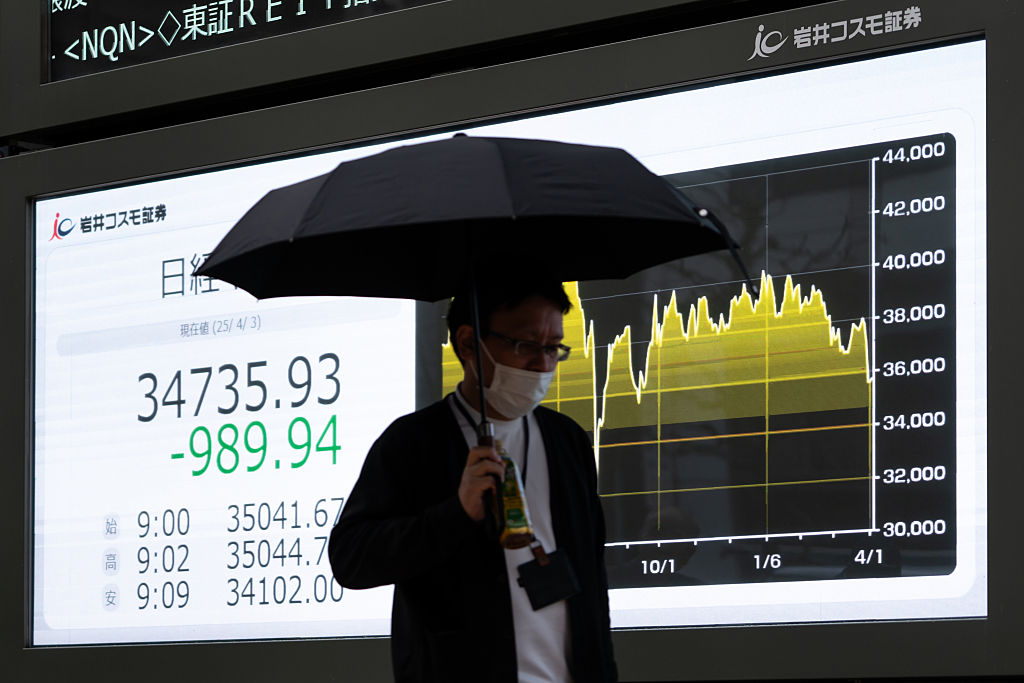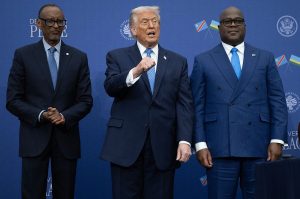In few places will the sense of shock and anxiety from Donald Trump’s tariffs be greater than in Japan. A whopping 24 percent has been slapped on exports to the US. The Japanese, who have grown used to a decent relationship with successive American administrations and a whopping trade surplus, will have many sleepless nights ahead.
The reaction here has not been one of anger or resentment – more stunned bemusement. Prime Minister Shigeru Ishiba, who did his best to cozy up to Trump on a recent summit in Washington (he presented Trump with a golden kabuto helmet) has said the tariffs are “very hard to understand.” The morning news, which usually dilutes the hard stuff with plenty of baseball and cherry blossom updates, was dominated by the tariff story, with the general tone being one of alarm and confusion. No one really knows what to do.
The most worried are probably the six million or so people employed in the auto industry. The big car makers, which are emblematic companies in Japan, had in any case been experiencing difficulties due to environmental regulations and falling sales. In a sign of the growing anxiety in the industry about the future, Toyota and Nissan came close to merging last year, a once unthinkable idea for two fiercely independent marques.
It is feared that the tariffs could devastate the industry, with the large number of small companies supplying parts likely to be worst affected. Mizuho securities has estimated that the tariffs could add an addition 1.6 trillion yen ($10.67 billion) to the costs of exporters to the US. That would be heavy blow to the big car makers but a possibly fatal one when passed on to the small parts manufacturers that form a central pillar of the industry.
Is there any hope? Perhaps, reading Trump and interpreting the seriousness of his pronouncements is a speculative exercise, but it was telling that he expressed affection for the Japanese (“great people”) when he got to Japan on his big tariff chart during his Liberation Day press conference. He does seem to have genuine affection for the country, one of the few places where he received a respectful reception when visiting during his first term. He had a warm “golf and hamburgers” relationship with then PM Shinzo Abe.
Trump does have genuine beefs with Japan though. He has long (going back to well before his political career) felt Japan has been taking advantage of the US through non-tariff barriers and currency manipulation and there was/is probably some truth in that (though on the other side Japan has invested hugely in the US). Trump also wants Japan to do more in its own defense to reduce its reliance on the US.
But the lack of outrage from Japan at the tariffs suggests there may be room for maneuver and hope. Ishiba has already signaled his willingness to ameliorate the economic pain by pledging to increase Japanese investment in the US to a trillion dollars. He has also said he wants to significantly strengthen Japan’s military capability and has taken some action towards this (by placing missiles capable of hitting China on one of Japan’s southern islands). A mutually satisfying recalibration on both these issues looks distinctly possible.
Certainly, Japanese policy makers will be praying so. Japan, even if it were minded towards retaliation, has few viable options. Japan’s imports from the US are largely commodities such as agricultural products and natural gas. Retaliatory tariffs would be self-defeating. There was no mention of retaliation in the comments of the prime minister or in a news conference today by chief cabinet secretary Hayashi, who merely declared the US action “regrettable.” Trade minister Yoji Muto sounded a cautious note when he said the government’s response needed to be “bold and speedy but calm and rational.”
Interpreting those comments and “reading the air,” as we say in Japan, the most likely strategy seems to be appeasement with some significant concessions and a measured, conciliatory tone, which will contrast starkly with the angry denunciations from elsewhere. Throw in an invitation from the emperor for another state visit and the day may yet be saved.


























Leave a Reply